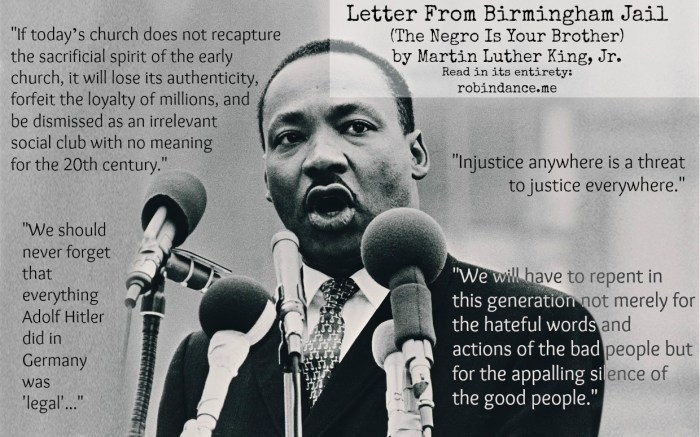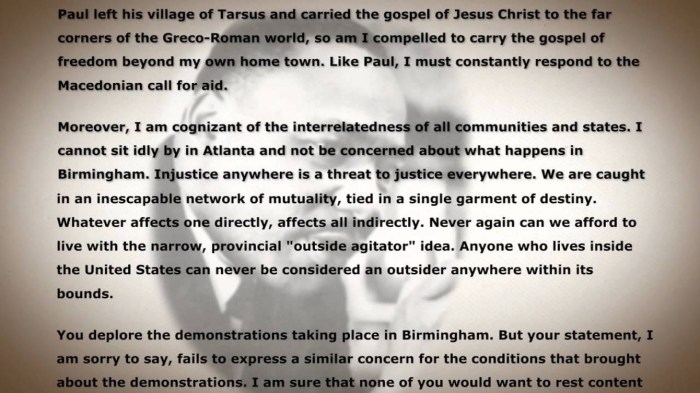Letter from birmingham jail ethos – The “Letter from Birmingham Jail” stands as a testament to the power of persuasive writing. At its core lies the concept of ethos, the credibility and trustworthiness of the writer. Martin Luther King Jr., the author of this seminal work, masterfully employs various techniques to establish his ethos, lending weight to his arguments and resonating with his audience.
King’s ethos is evident in his use of personal experience, citing his own unjust imprisonment as a poignant example of the systemic oppression he denounces. He also draws upon his deep understanding of Christian principles, appealing to the shared values of his audience and invoking a sense of moral obligation.
1. Ethos of “Letter from Birmingham Jail”

Ethos, derived from the Greek word for “character,” refers to the credibility and trustworthiness of a speaker or writer. In persuasive writing, ethos plays a crucial role in establishing the speaker’s authority and building trust with the audience.
Martin Luther King Jr. effectively establishes his ethos in “Letter from Birmingham Jail” through various strategies.
Specific Language and Techniques
- Use of titles and credentials:King identifies himself as a clergyman, a leader in the civil rights movement, and a recipient of the Nobel Peace Prize, enhancing his credibility.
- Personal anecdotes:King shares his own experiences with discrimination and injustice, making him relatable and sympathetic to his audience.
- Logical reasoning:King presents a well-reasoned argument, supporting his claims with evidence and appeals to reason.
- Moral authority:King draws on Christian teachings and the principles of justice and equality to support his stance, appealing to the moral compass of his readers.
2. Use of Rhetorical Devices

King employs a range of rhetorical devices in “Letter from Birmingham Jail” to strengthen his argument and connect with his audience.
Anaphora
- King’s repeated use of the phrase “I have been to the mountaintop” creates a powerful sense of rhythm and emphasis.
Metaphor
- King’s comparison of the struggle for civil rights to a “great symphony” illustrates the interconnectedness and importance of the movement.
Imagery, Letter from birmingham jail ethos
- King’s vivid descriptions of the injustices faced by African Americans, such as “the white man’s terrible inhumanity to the black man,” evoke strong emotions and empathy.
Allusion
- King’s references to historical figures and events, such as the Declaration of Independence and the Apostle Paul, lend credibility and authority to his arguments.
3. Appeal to Values and Beliefs
King’s letter effectively appeals to the values and beliefs of his audience, particularly their sense of justice, equality, and Christianity.
- Justice:King argues that the denial of civil rights to African Americans is a violation of fundamental principles of justice and fairness.
- Equality:King emphasizes the importance of treating all individuals with dignity and respect, regardless of their race.
- Christianity:King draws on the teachings of Jesus to support his call for nonviolent resistance and love for all.
4. Tone and Style
The tone and style of “Letter from Birmingham Jail” contribute significantly to its impact and effectiveness.
Tone:King’s tone is passionate, yet measured and respectful. He expresses a sense of urgency and moral outrage, while maintaining a level of composure and dignity.
Style:King’s writing is characterized by its eloquence, clarity, and use of rhetorical devices. He employs a mix of formal and informal language, making his message accessible to a wide audience.
5. Comparison to Other Texts
Comparing “Letter from Birmingham Jail” to other famous speeches and writings can provide insights into the effectiveness of persuasive writing.
Similarities:King’s letter shares similarities with other powerful speeches, such as Frederick Douglass’s “What to the Slave Is the Fourth of July?” and Sojourner Truth’s “Ain’t I a Woman?” in its use of personal anecdotes, logical reasoning, and appeals to values.
Differences:While these speeches share similar goals of social justice, they differ in their specific contexts and rhetorical strategies. For example, Douglass’s speech focuses on the hypocrisy of celebrating independence while enslaving African Americans, while Truth’s speech confronts the intersection of race and gender oppression.
Popular Questions: Letter From Birmingham Jail Ethos
What is the main purpose of the “Letter from Birmingham Jail”?
To respond to criticism from white clergymen and to justify the nonviolent protests in Birmingham.
How does King establish his ethos in the letter?
By drawing upon his personal experiences, his deep understanding of Christian principles, and his commitment to nonviolence.
What are some of the rhetorical devices used by King in the letter?
Anaphora, parallelism, repetition, and allusions to the Bible.